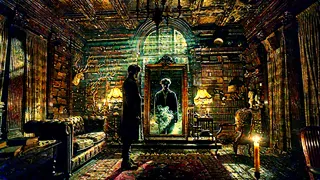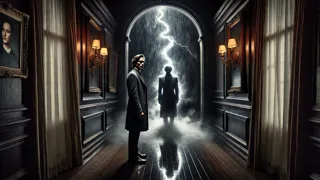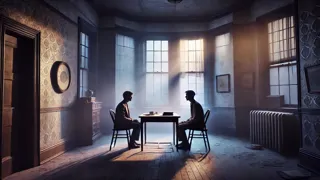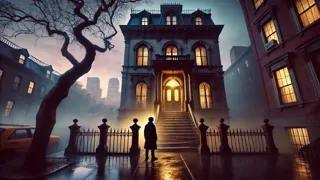Introduction
When Spencer Bryer’s return to New York was first announced among his colleagues in Florence, the news rattled the dust of memory buried deep within him. Yet, on a drizzly afternoon drenched in the golden-grey hush of autumn, it was not the city’s gleaming towers or roaring avenues that set Spencer’s heart drumming, but the vision of an old, derelict mansion standing silent on the jolly corner of West Twentieth Street—a relic stubbornly outliving the times. The house once belonged to his family, three stories of weathered brick, ornate stonework, and stained-glass eyes peering over the street, now shuttered against the world. During his years abroad, Spencer had imagined the place shrinking into irrelevance, but there it brooded: isolated, guarded by iron rails and the frown of a gnarled elm tree, its windows dusted in neglect. For two decades, he’d thrived amid the Renaissance sun, a renowned art restorer cloaked in the dust of basilicas, yet something had called him home—a message from an attorney, a paper to sign, but more profoundly, the pulse of unresolved chapters.
On the stoop, the chill pressed deeper than the city’s drizzle as Spencer slid the tarnished key home, hearing the ancient bolt’s reluctant groan. Inside, lavender-scented air faded beneath a heavier perfume: age, memory, and the faintest echo of burnt candle wax. The grand foyer greeted him like an old adversary; the staircase curled upward, its banister smooth and familiar beneath his hand. Decades disappeared as he climbed, each creak underfoot a prelude to secrets. Upstairs, curtains wavered timidly over cracked windowpanes, and portraits glared from the walls—images of ancestors, stilled by the ache of time. The pulse of the house, old and slow, seemed to synchronize with Spencer’s own, as if together they braced for a haunting neither could name. Unpacking his duffel, he realized his return wasn’t strictly for business. As dusk leaked deeper, the house, and whatever history it harbored, began to awaken.
Whispers in the Walls
The mansion’s silence proved deceptive. Not long after Spencer settled in, wrapped in a threadbare coat against the draft, he was awakened by the first disturbance. It struck just after midnight—a low scraping, almost furtive, like a shoe sliding across distant marble. Spencer’s mind twisted to rational explanations: pipes, rodents, settling beams. Yet the repetition—measured, deliberate—upped the chill along his spine.

He stood in the dark-paneled corridor, wavering between curiosity and apprehension. The flick of a lighter summoned a trembling candle flame, its golden pool pushing back the gloom. Shadows splayed along the patterned rug as Spencer inched toward the parlor, where oil portraits glowered in broader strokes.
On the heavy desk in his late father’s library, a ledger lay open—he was certain he’d left it shut. One page was dog-eared, the side margin scored with a neat X in red pencil. ‘Missed opportunities,’ the title read in his own looping script from a night before. A coincidence, perhaps, born of nervous hands. Or was he alone?
He dropped into the worn leather chair, eyes traveling the library’s length. Floorboards yielded under a sudden, unseen pressure. The air thickened. Spencer’s senses sharpened: the faint ticking of a grandfather clock downstairs, the near-silent swirl of autumn wind breaching a window frame.
He rose and traced the source of the cold, finding it pooled in the back corridor by the butler’s pantry. His light caught a shape—his own reflection—preserved in a tall, tarnished mirror. Yet as he drew closer, heart hammering, it seemed the figure within the glass did not mimic his movement at all. The apparition stared back, older, grim-faced, a stranger cloaked in a sharper suit and heavier eyes—eyes that accused rather than questioned. Spencer’s hand trembled; the reflection did not.
Then—almost imperceptibly—the reflected figure smiled, the twist of his mouth tinged with bitterness. Spencer recoiled sharply, candle singing his knuckles. The glass rippled as if breathed upon, but there was no warmth in the air. A draft sent the flame guttering, and darkness reclaimed the hall.
Unable to sleep, Spencer loafed through the parlor’s shadows, his pulse skipping at every creak or sigh. He remembered childhood games of hide and seek, laughter echoing off these empty walls, and wondered what lingered beneath. When dawn threaded lilac through the warped glass, he found himself in the musky warren that had belonged to his mother. Rummaging through her remnants, he uncovered a tiny, silver-framed photograph—the kind he’d never noticed as a boy. The image was brittle but clear: himself, perhaps nine, standing with a boy he did not recognize but who bore his features.
Questions pressed down, suffocating. He brewed strong coffee, the bitterness tethering him to reality. Was he unraveling, too long away from home, or had the house acquired a new occupant—one shaped by regrets and the life he’d abandoned? If the walls whispered, as old houses do, what story did they wish him to hear?
The Echoing Double
In the relentless city, days leaked into nights. For Spencer, every evening became a pageant of shadows and suspicions. The streets throbbed outside—honking, shouting, the endless pulse of cabs—while inside, the mansion shimmered with phantoms both real and imagined. Each night, the house’s atmosphere thickened: walls pressed in, door handles turned gently beneath unseen hands, and Spencer’s anxieties crystallized into dread.

Unable to resist, he began chronicling these disturbances in a leather-bound journal, each entry more frantic and questioning. His dreams grew feverish—he chased an elusive figure through the mansion’s sunken halls, always a step behind, always catching a glimpse of himself in a life unexplored. Daylight offered scant relief. He would hear his name whispered from empty stairwells, see his belongings subtly rearranged, find cryptic notes in his own handwriting but spelling out warnings—‘You cannot hide from yourself’—stuffed inside desk drawers.
On an especially bleak evening, storm clouds bruised the sky, lightning lacing the Manhattan skyline. Spencer sought solace near the third floor, moving from dusty vistas to the attic beneath a sloping roof. There, the air was heavy with cedar and faded mothballs. He pried open a trunk and found a collection of unsent letters, each addressed to ‘S.B., Esq.,’ with subtlety chilling: detailed accounts of business ventures never pursued, cities never visited, lovers never met. The letters were dated with years he’d spent abroad, as if penned by another version of himself. Their contents gripped his imagination—each letter painted a future both tempting and terrifying.
That night, as the wind howled and rain lashed the stained glass, his ghostly double returned. Spencer, sleepless, roamed the grand hall at midnight. Suddenly, the heavy velvet curtains breathed outward, disturbed by a current not wholly of this world. Where the foyer’s twin mirrors drank in the gloom, his reflection blinked out: in its place, the double materialized, more solid than before. Dressed in a crisp suit, silver at the temples, eyes hollowed by success and sacrifice, it stood as the likeness of a life achieved at the cost of joy.
The double’s voice, when he spoke, was both familiar and alien. “Did you ever wonder,” he intoned, “what your hands might have built, had you only stayed? All you fled has grown inside these walls.”
Spencer, choked by the encounter, could hardly muster a reply. But rage and sorrow clashed in his chest. “You’re not my ghost,” he said at last, “but some puppet of regret. You know nothing of the years I lived.”
The apparition’s smile twisted, darkly paternal. “And yet, here you are—all roads lead back. What would you give for one more chance to shape yourself?”
The room pulsed with a cold, magnetic force, as if the house itself braced for his answer. Spencer tried to grip the reality of his own choices: Florence’s sun, the feel of paint beneath his hands, laughter from friends found abroad. The double pressed closer. “You fear you’ve failed, wasted the inheritance of possibility. Some men become ghosts in the houses they never built.”
Then, all at once, the apparition faded, swallowed by a surge of icy wind. Spencer collapsed onto the hall’s threadbare rug, the encounter burned into his nerves. When he awoke—candle guttered out, morning bleak beyond the windows—he could not banish the sense of having been judged by himself. Was he prisoner of a life half-lived, or the architect of his own redemption?
The Room Down the Hall
The following days passed in strange clarity. Spencer, exhausted by fear but now guided by a surge of defiance, resolved to face the house—and himself—on his own terms. He mapped every inch of the mansion, flashlight in hand, following the subtle trail his double had threaded across the rooms. Noises came and went—whispers lost in draughts, music leaking from broken radios—yet none disturbed him so deeply as the silent invitation emanating from a locked room down the northern hall.

He’d avoided that faded door for reasons he’d never quite named. With trembling determination, Spencer forced the lock. Inside, dust motes drifted through a lattice of twilight as moth-eaten wallpaper peeled away from the years. A table was neatly set for two; in its center, a stack of journals—his own, but written in another’s script—documented an entire life unlived. This alternate Spencer had built a fortune, run enterprises, cultivated a relentless reputation. Pages overflowed with contracts, appointments, but also confessions of profound solitude.
As dusk deepened, a final presence stirred. The double returned, this time softer, almost wistful. No longer confrontational, he seemed to carry both burden and vulnerability. “Every choice closes a thousand doors,” he murmured. “But you—Spencer—you are not only the sum of what you’ve missed. The future asks for forgiveness, not perfection.”
Moved by this shift, Spencer asked the question that had haunted him most. “Are you my failure—or just my shadow?”
The double’s eyes, once accusatory, glittered with ambiguous empathy. “I am only longing made flesh. You must forgive me, and forgive yourself. Let the past rest. Build what you can, while time remains.”
At that, the ghost retreated, the edges of his form lit not by fury but by quiet release. The mansion exhaled. Windows tingled with a warmer dusk. Spencer felt, for the first time since returning, a glimmer of peace. He sat at the set table, writing a letter—to himself this time—thanking both the man he’d become and the one he’d never been.
Night cloaked the city, but inside the old house, Spencer found rest at last. He slept, undisturbed by needle-sharp regret, until the birds outside drew mauve light along the slate roof. The mansion remained silent but no longer hostile. Its every corridor, a valediction for the past—a beginning, not an end.
Conclusion
Even in a city that swallows memory and obliterates the names inscribed beneath old streetlamps, homecomings possess a gravity hope and regret alone cannot explain. Spencer Bryer’s journey through the mansion’s shadows was never about ghosts in the conventional sense, but the frightening intimacy of facing one’s alternate destiny. Regret and longing are specters that prowl every life—but as Spencer learned, they are bearable, even illuminating, when met with mercy and reflection. The jolly corner need not harbor only echoes of the unlived; sometimes, in the hush after confrontation, what’s left is the courage to continue carving meaning from whatever time remains. Walking through the familiar city streets at dawn, Spencer felt the mansion’s weight lightened on his soul. The true haunting was over; the rest was living, open to all the undiscovered corners within and without.

















